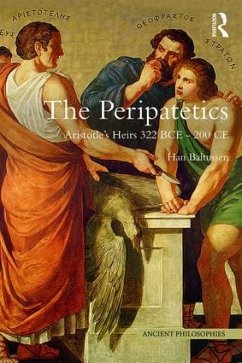The Peripatetics explores the development of Peripatetic thought from Theophrastus and Strato to the work of the commentator Alexander of Aphrodisias. The book examines whether the internal dynamics of this philosophical school allowed for a unity of Peripatetic thought, or whether there was a fundamental tension between philosophical creativity and the notions of core teachings and canonisation. The book discusses the major philosophical preoccupations of the Peripatetics, interactions with Hellenistic schools of thought, and the shift in focus among Greek philosophers in a changing political landscape. It is the first book of its kind to provide a survey of this important philosophical tradition.
This is an accessible and reliable introduction to a little-known, but historically pivotal, tradition within ancient thought: the followers of Aristotle from his immediate successors to the great commentator Alexander of Aphrodisias. Baltussen is particularly interesting on the question of authority. He shows that allegiance to Aristotle was compatible with originality, and charts disagreements between the Peripatetics as well as their attempts to defend the Aristotelian position against rival schools. Ultimately Aristotle would become "the" philosopher, and study of his works would become synonymous with philosophy itself; Baltussen explains the pre-history of that development.
- Professor Peter Adamson, Ludwig Maximilian University of Munich, Germany
"...it is clear that this new book by Han Baltussen well serves its purpose, namely, to become an introductory reading for students and scholars interested in the development of an important but relatively neglected tradition."
- Eugene Afonasin, Novosibirsk State University, Russia, in the Bryn Mawr Classical Review
- Professor Peter Adamson, Ludwig Maximilian University of Munich, Germany
"...it is clear that this new book by Han Baltussen well serves its purpose, namely, to become an introductory reading for students and scholars interested in the development of an important but relatively neglected tradition."
- Eugene Afonasin, Novosibirsk State University, Russia, in the Bryn Mawr Classical Review

